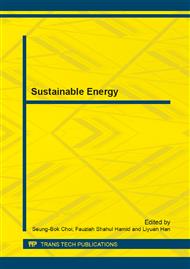[1]
EIA. International Energy Outlook 2011, Highlight, pp.1-8.
Google Scholar
[2]
EIA. Annual Energy Outlook (2013).
Google Scholar
[3]
GAO Jie, GEN M, et al. Scheduling jobs and maintenances in flexible job shop with a hybrid genetic algorithm[J]. Journal of Intelligent Manufacturing, 2006, 17(4): 493-507.
DOI: 10.1007/s10845-005-0021-x
Google Scholar
[4]
WANG Shijin, YU Jianbo. An effective heuristic for flexible job-shop scheduling problem with maintenance activities[J]. Computers & Industrial Engineering, 2010, 59(3): 436-447.
DOI: 10.1016/j.cie.2010.05.016
Google Scholar
[5]
MORADI E, FATEMI G S, et al. Bi-objective optimization research on integrated fixed time interval preventive maintenance and production for scheduling flexible job-shop problem[J]. Expert systems with applications, 2011, 38(6): 7169-7178.
DOI: 10.1016/j.eswa.2010.12.043
Google Scholar
[6]
LI Junqing, PAN Quanke. Chemical-reaction optimization for flexible job-shop scheduling problems with maintenance activity[J]. Applied Soft Computing, 2012, 2(9): 2896-2912.
DOI: 10.1016/j.asoc.2012.04.012
Google Scholar
[7]
Wang, L., G. Zhou, et al. An effective artificial bee colony algorithm for the flexible job-shop scheduling problem[J]. The International Journal of Advanced Manufacturing Technology. 2012, 60(1-4): 303-315.
DOI: 10.1007/s00170-011-3610-1
Google Scholar
[8]
Crow L.H., Reliability analysis for Complex Repairable Systems. Reliability and Biometry, Philadelphia: SIAM, (1974).
Google Scholar
[9]
Camposeco-Negrete, C. Optimization of cutting parameters for minimizing energy consumption in turning of AISI 6061 T6 using Taguchi methodology and ANOVA[J]. Journal of Cleaner Production, 2013, 53, 195-203.
DOI: 10.1016/j.jclepro.2013.03.049
Google Scholar
[10]
M. B. Yildirim. A framework to minimise total energy consumption and total tardiness on a single machine[J]. International Journal of Sustainable Engineering, 2008, 1(2): 105-116.
DOI: 10.1080/19397030802257236
Google Scholar
[11]
Deb, K., Pratap, A., Agarwal, S., and Meyarivan, T. A fast and elitist multi objective genetic algorithm: NSGA-II[C]. Evolutionary Computation, IEEE Transactions on, 2002, 6(2), 182-197.
DOI: 10.1109/4235.996017
Google Scholar
[12]
Kacem I, Hammadi S, Borne P. Pareto-optimality approach for flexible job-shop scheduling problems: hybridization of evolutionary algorithms and fuzzy logic[J]. Math ComputSimul, 2002, 60(3–5): 245–276.
DOI: 10.1016/s0378-4754(02)00019-8
Google Scholar


